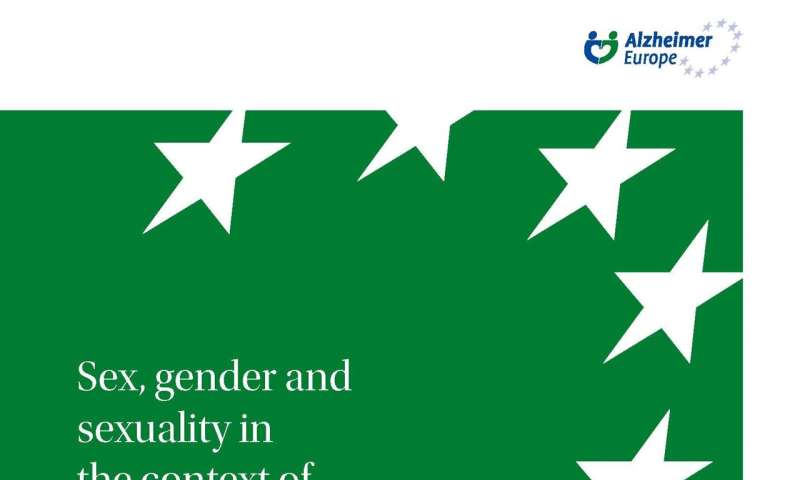Alzheimer Europe launches new report on sex, gender and sexuality in the context of dementia

This report aims to promote the right of every person with dementia, irrespective of their sex, gender identity and sexual orientation, to be treated with respect and to have access to timely diagnosis, treatment and good quality care and support.
It focuses on seeking and obtaining a diagnosis, living one's sex, gender and sexuality with dementia, accessing and using professional services and support.
It highlights and challenges broader societal influences and structures.
The overall emphasis is on recognising and challenging prejudice, discrimination and injustice, not only towards marginalised minority groups (such as LGBT* people, people from minority ethnic groups etc.) but also towards women.
Luxembourg, 25 February 2022 – Alzheimer Europe today launched a new report: "Sex, gender and sexuality in the context of dementia: a discussion paper".
Sex, gender and sexuality are fundamental aspects of people's lives. Information about people's sex, gender and sexuality is typically considered as socially salient and serves, to some extent, as a basis for how they are perceived and treated, and for all kinds of assumptions about their interests, needs, capacities and wishes. These aspects of personal identity influence self-perception, how people position themselves within society and how they are positioned by society. They are not the sum total of who people are, but may come to the fore and impact on people's lives at certain times and in certain contexts or situations.
Our aim, in this report, was to promote the right of every person with dementia, irrespective of their sex, gender identity and sexual orientation, to be treated with respect and to have access to timely diagnosis, treatment and good quality care and support. We specifically targeted policy makers, health and social care students and health and social care professionals/service providers because they are the people who can make the necessary changes to improve the lived experience of people with dementia of all sexes, gender identities and sexual orientations.
The report starts with an overview of the terminology and concepts related to this topic and briefly mentions the guiding theoretical framework (covering heteronormativity, intersectionality, micro-aggressions and feminism), which is described in depth in the Appendix, and accompanied by a useful glossary. The rest of the report focuses on seeking and obtaining a diagnosis, living one's sex, gender and sexuality with dementia, accessing and using professional services and support. The authors explore the various issues insofar as they relate to people with dementia, their carers/supporters and health and social care professionals and service providers, always bearing in mind, as well as challenging, broader societal influences and structures.
The emphasis throughout this report was on recognising and challenging prejudice, discrimination and injustice, not only towards marginalised minority groups (such as LGBT* people, people from minority ethnic groups etc.) but also towards women (who make up the majority of the population with dementia in most countries), hence our adoption of feminism as part of our guiding theoretical framework. This does not exclude or discriminate against men. Their needs and interests must also be recognised and they may also be adversely affected by heteronormativity, as may people who do not have a long-term partner and women and men who do not have children.
The report is the outcome of work carried out by experts in the fields of dementia, gender studies, ethics, ageing, service provision, training of healthcare professionals and psychology. The expert working group was composed of men and women with and without dementia, and with different gender identities and sexual orientations. Some also had contact with people from gender and sexual minority groups who kindly provided testimonials on a few issues. Alzheimer Europe would like to thank the members of the ethics working group, namely Dianne Gove (Chair), Aileen Beatty, Andrea Capstick, Patrick Ettenes, Jean Georges, Fabrice Gzil, Phil Harper, Helga Rohra, Linn Sandberg, Anthony Scerri, Charles Scerri, Annemarie Schumacher Dimech and Karin Westerlund.
Jean Georges, Executive Director of Alzheimer Europe, commented:
"I am delighted that, following our work on intercultural care and support for people with dementia, we are now publishing recommendations on how policy makers, health and social care professionals and students of health and social care, among others, can ensure that people with dementia do not meet with prejudice and discrimination based on their sex, gender identity and sexuality, but rather that these factors are taken into account to provide appropriate care and support that is both adapted to their personal needs and mindful of their rights."
Helga Rohra, co-author of this paper, said the report was "a new and highly-awaited insight into a neglected part of a person with dementia: sexuality. See behind my disease—focus on heterogeneity! I am still me, with all my needs and longings!"
The report is currently available in English and can be freely downloaded from the Alzheimer Europe website: www.alzheimer-europe.org/repor … tia-discussion-paper
We will now turn our attention to the development of a compact guide for health and social care workers, a policy statement and a short summary that is accessible to a broader public, including people with dementia and carers/supporters.
For further information about the report, please contact Dr. Dianne Gove, Director for Projects: dianne.gove@alzheimer-europe.org
More information:
www.alzheimer-europe.org/news/ … ity-context-dementia
Provided by Alzheimer Europe